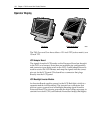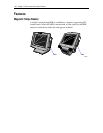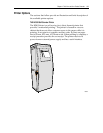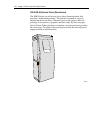
Chapter 1: 7401-2xxx and 3xxx Product Overview 1-23
BIOS Upgrades
Flash memory makes distributing BIOS upgrades easy. A new version
of the BIOS can be installed from the hard disk, network or through a
serial port.
The disk-based Flash upgrade utilities, Phlash.exe and WinPhlash,exe,
ensure the upgrade BIOS extension matches the target system to
prevent accidentally installing a BIOS for a different type of system.
Setup Utility
The ROM-based Setup utility allows the system configuration to be
modified without opening the system for most basic changes. The
Setup utility is accessible only during the Power-On Self Test (POST)
by pressing the <F2> key after the POST memory test has begun and
before boot begins. A prompt may be enabled that informs users to
press the <F2> key to access Setup.
Note: An external alphanumeric keyboard is recommended for
running the BIOS CMOS Setup Utility. Otherwise, a Touch Screen can
be used.
Plug and Play
The Processor BIOS also has a setup option to support the Windows
runtime plug and play utilities. When this option is selected, only
devices critical to boot are assigned resources by the BIOS. Device
Node information is available for all devices to ensure compatibility
with Windows 95. System configuration information is stored in ESCD
format. The ESCD data will be cleared upon loss of the CMOS voltage.
Advanced Power Management
The 7401 Release 2.0 – 2.4 Processor BIOS has support for both 1.1 and
1.2 Advanced Power Management (APM). The version of APM drivers
loaded in the operating system determines to which specification the
BIOS adheres. In either case, the energy saving Standby mode can be
initiated by a time-out period set by the user.


















